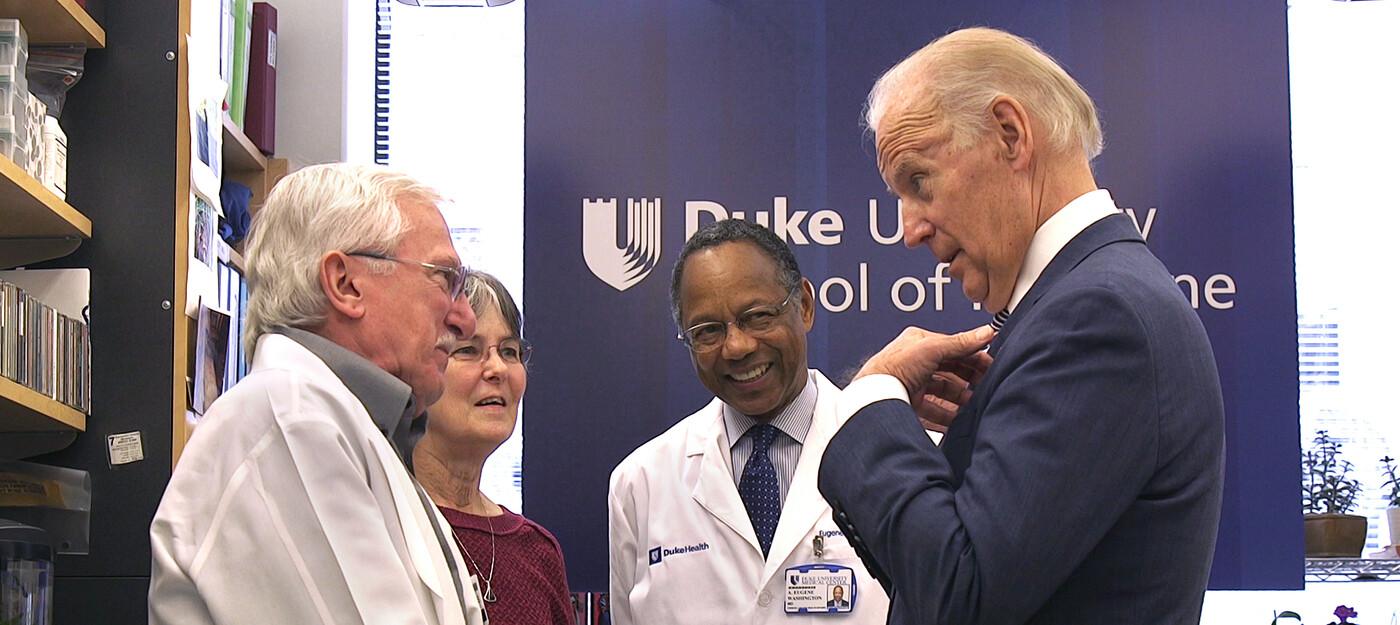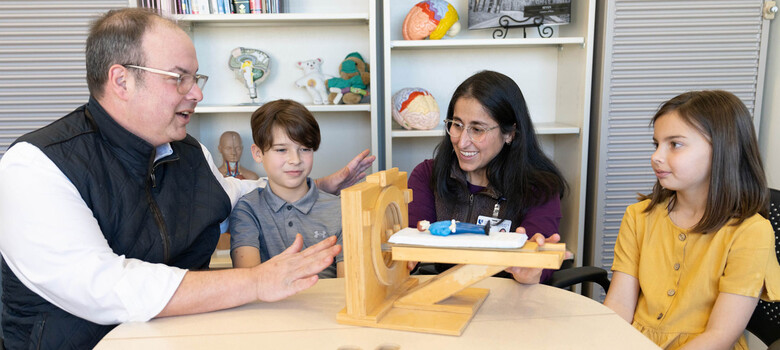 From the DukeHealth.org archives. Content may be out of date.
From the DukeHealth.org archives. Content may be out of date.
Vice President Joe Biden Visits Duke as Part of Cancer Cure Initiative

Nobel prize winner Paul Modrich, PhD, Vickers Burdett, and Duke Health Chancellor Eugene Washington, MD, meet with VP Joe Biden
Invoking the aspirational spirit that put U.S. astronauts on the moon, Vice President Joe Biden visited Duke Health today as part of the national “Moonshot” initiative he is leading to advance cancer research.
Biden Urges Groups to Work Together to Find Cancer Cure
With the Duke Cancer Institute and the Duke University School of Medicine as a backdrop, the vice president cited the unique history of the Research Triangle area, where major universities, biotechnology companies and federal research agencies have long combined forces, demonstrating the sort of collaborative efforts that the cancer cure moonshot aims to foster nationwide.
“I’m not naive that we are going to cure every cancer,” Biden said during a round table discussion, noting that more government funding is just one element necessary to achieve the moonshot’s goal of condensing a decade worth of research advances into just five years. Biden urged all groups to work together across academic disciplines, joining business and industry, philanthropic organizations, advocacy groups and others.

“It’s a very exciting time in cancer right now, and it’s a very challenging time,” said Michael Kastan, MD, executive director of the Duke Cancer Institute.
VP's Visit Highlights Duke's Leadership Role
A. Eugene Washington, MD, chancellor for health affairs at Duke University and president and chief executive officer of the Duke University Health System, said the vice president’s visit highlights the leadership role Duke is prepared to play in bringing together those disparate communities in a united front against cancer, which has proven to be a formidable foe.
“Vice President Biden's visit with our Duke Health community was a great honor,” Washington said. “We very much appreciated the opportunity to discuss how we are conducting cutting-edge research and to have him lead a productive dialogue with our world-class faculty and community leaders.
“Today's events are also a tremendous validation of the efforts of people at all levels of our health enterprise,” Washington said. “Because of their work, we at Duke Health are uniquely positioned to accelerate discovery in cancer research and its translation into public benefit.”
VP Meets with Duke Nobel Prize Winner and Others
As part of his visit to Duke on Wednesday, Vice President Biden met with Dr. Paul Modrich, who shared the 2015 Nobel Prize in Chemistry with UNC’s Dr. Aziz Sancar. Both scientists have been pioneers in the study of DNA repair, which has been crucial to understanding how cell repair mechanisms can go awry and lead to cancer, and Biden cited the “groundbreaking work” as the kind of science that should be further fostered.
The vice president also met with Dr. Matthias Gromeier, of the Preston Robert Tisch Brain Tumor Center at Duke, whose work has focused on a modified form of the poliovirus as an innovative brain cancer therapy. The work is showing promising results in an early clinical trial, and was featured in a two-part segment on 60 Minutes last March.

“In my view, the science is ready, the science is ready,” Vice President Joe Biden said.
Biden Praised Brain Cancer Research
During the round table discussion, Biden singled out the first patient treated with the poliovirus therapy, Stephanie Lipscomb, whom he met in a private gathering. Noting that she looked “as healthy as can be,” Biden praised the innovation involved in the research endeavor.
“In my view, the science is ready, the science is ready.” Biden said. “I believe we can make much faster progress –- as an outsider looking in from a different perspective -- if we see greater collaboration, greater sharing of information, breaking down some of the research that is trapped inside of silos.”
Michael B. Kastan, MD, PhD, executive director of the Duke Cancer Institute, said the two Duke researchers were ideal ambassadors to meet the vice president – chosen among dozens of worthy researchers and clinicians doing breakthrough work – because they represent how discoveries in the laboratory lead to new treatments or clinical approaches that ultimately benefit patients.
Round Table Discussion with Key Cancer Community Leaders
“Outstanding basic science in the laboratory can impact our understanding of cancer development and lead to new therapies for cancer – it’s the perfect example of what we call translational impact,” Kastan said.
After Biden wrapped up the laboratory tour, which was led by John Sampson, MD, chair of the Department of Neurosurgery, the vice president held a round table discussion with key leaders in the cancer community who were convened to share their aspirations for the moonshot.
Kastan said he was honored that Duke was chosen by the vice president as a he is gathering information and putting together the various pieces that will enable his cancer moonshot to lead to the goal that everyone seeks – a cure for cancer.
“it’s a very exciting time in cancer right now, and it’s a very challenging time,” Kastan said. “When the National Cancer Act was passed in 1971 by Congress, people expected that discoveries were going to be made very quickly. But we were in no position to quickly advance our diagnosis and treatment of cancer at that time.”
After 40 years of research and development, however, the field is at a pivotal point, Kastan said. The vice president’s advocacy for the moonshot initiative could be that final push that enables science to reach its goal.
“In many ways, Vice President Biden is asking the same questions we are,” Washington said. “How do we accomplish 10 years of advancement in five years? How do we really pick up the pace? In research, education, patient care, and our communities locally and globally, that is exactly what we aspire to do and what we will do.”



